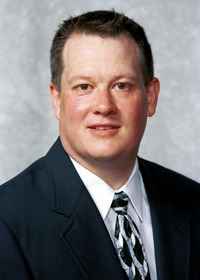Information Possibly Outdated
The information presented on this page was originally released on October 1, 1999. It may not be outdated, but please search our site for more current information. If you plan to quote or reference this information in a publication, please check with the Extension specialist or author before proceeding.
Sod Crop Yields Bright Spot In 1999 Ag Picture
MISSISSIPPI STATE -- Depressed markets and the summer drought may discourage row-crop farmers, but Mississippi's emerging sod industry glistens as one bright spot in this year's agricultural picture.
Dr. David Nagel, horticulturist with Mississippi State University's Extension Service, said almost all of Mississippi's 45 sod growers have already sold out of their crop. The good news for those who haven't sold their crop is that failure to sell this year's crop should result in a better quality grass next year.
With about 4,500 acres of commercial sod, the industry has grown to about a $36 million business in Mississippi.
DeSoto County agricultural agent Art Smith said growers can sell bermudagrass for about $50 per pallet, which is 50 square yards. They can harvest an average of 70 pallets per acre. Consumers will pay at least $70 at a yard and garden center for a pallet.
Quality and demand will influence the price of sod significantly. Growers must monitor regularly for weeds and insects.
"DeSoto County is one of the best markets for sod because of all the business and housing growth, but there is also a lot of potential for this industry to expand throughout the state," Smith said.
Every year in the business will increase Mississippi growers' success in the market and in the quality of grass they produce.
"We still have to import from surrounding states that have been in the sod business longer than most Mississippi growers, but as new construction continues in this state, the need for more local growers will increase," Nagel said. "Convenience and timeliness are important market factors."
The cost and effort to maintain quality sod throughout the shipping process can make purchasing out-of-state sod impractical for some Mississippi customers.
Smith said sod farming provides an ideal crop for farmers to diversify their crops or just as a second source of income.
"Sod farms are well suited to row-crop fields. You want the land as flat as possible. When you plant on a hill, you open yourself up to erosion when you harvest," Smith said.
Nell Cobb is the co-owner of Mississippi Grass Nursery in Hattiesburg, Mississippi's oldest sod farm. Since her father started the business about 35 years ago, there has been a boom in turfgrass research. Customers, such as golf course designers, have begun requesting more customized, detailed landscape designs with some of the newer grass varieties.
Over the years, Cobb's family business has added to their traditional bermudagrass plantings new fields of centipedegrass and the other grasses recently developed at land-grant universities such as MSU.
"Growing sod is very labor intensive and takes a great deal of hands-on attention," Cobb said. "It's also a very fulfilling business. You produce a beautiful product that you can take a lot of pride and satisfaction in watching it grow on golf courses and around newly constructed homes and businesses."




